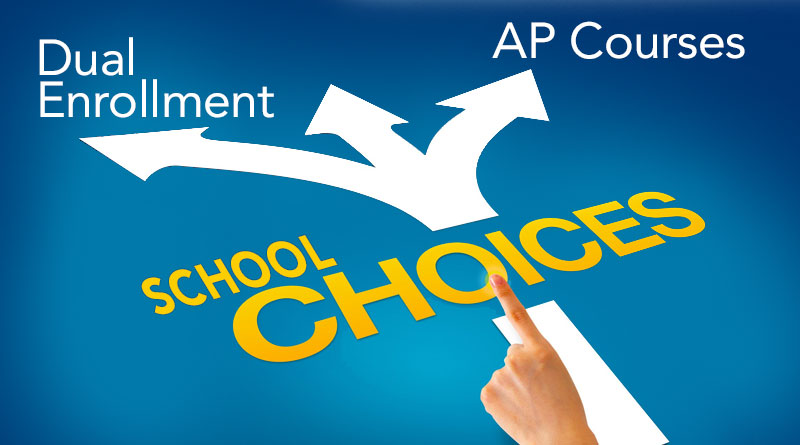It is the end of the first nine weeks. Yay! A quarter of the way done with the school year! I am guessing that you Dual Credit and Advanced Placement students are halfway through with your classes by this point, or perhaps you don’t start until next semester. Or maybe you haven’t taken any AP or DC classes at all and I am just assuming things. If you are in an AP or DC class ,I’m sure you’ve gotten the hang of it by now, so this article is not necessarily made for you. Instead, this is for the new, curious students who do not know which class is a better fit for them. Either way, stick around and find out what each class has to offer.
Dual Credit Pros
Dual credit classes are college classes hosted through a community college or university near us, such as Northwest or Delta State. These classes are offered to help students receive both high school and college credits simultaneously. They are typically taken online, besides the few classes that we offer at the school such as dual credit english and college algebra, for a nine weeks or a semester. Taking these classes now in high school is a pro because we will not have to take the classes whenever we get to college. Another pro that comes with taking the class is the low difficulty rate. Dual credit classes are harder than regular classes, but they overall are not that difficult. The work is moderate, and typically due at the end of the week. When comparing dual credit classes to AP classes, dual credit classes are definitely easier with fewer deadlines.
Advanced Placement Pros.
Advanced placement classes are classes taken through College Board. These classes offer college credits that are accepted at any college, unlike Dual Credit classes. AP classes typically only cost $89 to take, which covers the cost of the AP exam taken in May. These classes are taken in a Semester and go more into depth than a regular high school or dual credit class. This is a pro to me, mostly because I am a nerd, but really because I love to learn.
Dual credit Cons.
You might think taking a dual credit class in high school means you won’t have to take that class in college. However, that is not always the case. These class credits may not always be accepted at every college. If you plan on going to an out of state school, the dual credit classes you take in high school may not transfer, thus meaning you have to retake the class in college. This would essentially mean that taking the class in High school was for nothing, but a waste of money. Which leads me into another con of DC classes: the price. In my own experience, I have paid $250+ for a dual credit class. While price may not be a concern for everyone, it is still something to weigh and consider, especially if you don’t know if the credit will transfer to the college of your choice. Some classes generally aren’t that expensive while some are priced higher than $250. Either way, make sure to talk to your parents and counselors before signing up.
Advanced Placement Cons.
While AP classes give college credit and are accepted everywhere, unlike DC, in order to get the credit you must pass the AP exam. The good news is the exam scores are from one through five and you only need a three to pass. Now, in order to pass, another con that comes with AP classes, is the knowing of the material. As I said before, AP classes do go more in depth with information than any other classes. In our block schedules, this means that a full year of information must be taught and learned in a semester. Because of this, a lot of studying will be on your own time. You must watch videos, take practice tests, and buy books. This may be a con for those who do not want a heavy workload, but I have always said, that the AP exam workload prepares you for college and teaches you how to study on your own time.
And so you have it. An advanced placement and dual credit student’s opinion. Take it with a grain of salt or take it to heart, besides my personal inputs, everything I said can be found online through College Board, or through Northwest or Delta State. Both classes offer a lot and are weighted the same on a 6.0 scale. Look at the pro’s and con’s I listed, and talk to AP and DC teachers at our school to see which one fits you best.








